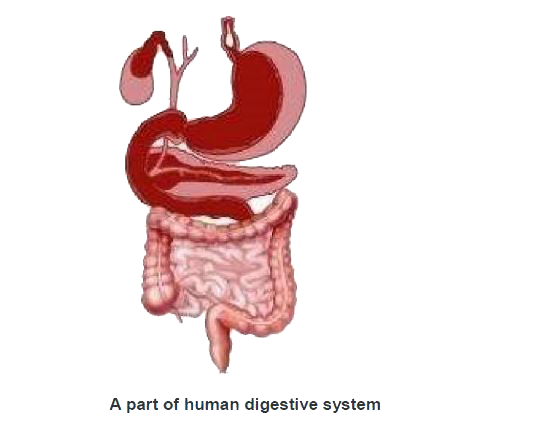Define the Digestive system
Step-by-Step Solution:
1. Definition of the Digestive System:
The digestive system is an organ system in the body that is responsible for breaking down food into simpler forms that can be used by the body.
2. Components of the Digestive System:
The digestive system consists of two main parts:
- Elementary Canal: This is a long tube that includes:
- Esophagus: The tube that connects the throat to the stomach.
- Stomach: The organ where food is mixed with digestive juices.
- Small Intestine: The part of the digestive system where most of the digestion and absorption of nutrients occurs.
- Large Intestine: The part that absorbs water and forms waste products (feces).
- Accessory Glands: These are organs that aid in digestion but are not part of the digestive tract. They include:
- Liver: Produces bile, which helps digest fats.
- Pancreas: Produces digestive enzymes and hormones.
- Gallbladder: Stores bile produced by the liver.
- Salivary Glands: Produce saliva that begins the digestion of carbohydrates.
3. Function of the Digestive System:
The main function of the digestive system is to break down complex food substances (like proteins, starches, and fats) into simpler, usable forms (like amino acids, glucose, and fatty acids) that the body can absorb and use for energy, growth, and repair.
The digestive system is an organ system in the body that is responsible for breaking down food into simpler forms that can be used by the body.
The digestive system consists of two main parts:
- Elementary Canal: This is a long tube that includes:
- Esophagus: The tube that connects the throat to the stomach.
- Stomach: The organ where food is mixed with digestive juices.
- Small Intestine: The part of the digestive system where most of the digestion and absorption of nutrients occurs.
- Large Intestine: The part that absorbs water and forms waste products (feces).
- Accessory Glands: These are organs that aid in digestion but are not part of the digestive tract. They include:
- Liver: Produces bile, which helps digest fats.
- Pancreas: Produces digestive enzymes and hormones.
- Gallbladder: Stores bile produced by the liver.
- Salivary Glands: Produce saliva that begins the digestion of carbohydrates.
The main function of the digestive system is to break down complex food substances (like proteins, starches, and fats) into simpler, usable forms (like amino acids, glucose, and fatty acids) that the body can absorb and use for energy, growth, and repair.
Topper's Solved these Questions
- DIGESTIONBook:BETOPPERSChapter:DIGESTIONExercise:SUMMATIVE WORKSHEET (ANSWER THE FOLLOWING )
Explore 11 Videos
- DIGESTIONBook:BETOPPERSChapter:DIGESTIONExercise:SUMMATIVE WORKSHEET (NAME THE FOLLOWING )
Explore 2 Videos
- DIGESTIONBook:BETOPPERSChapter:DIGESTIONExercise:SUMMATIVE WORKSHEET (FILL IN THE BLANKS )
Explore 10 Videos
- BASIC BIOLOGYBook:BETOPPERSChapter:BASIC BIOLOGYExercise:Summative Worksheet (Which of the statement is true (T) and which one is false (F)? Mark T or F)
Explore 8 Videos
- LIFE UNDER A MICROSCOPE ( MICROOGANISMS)Book:BETOPPERSChapter:LIFE UNDER A MICROSCOPE ( MICROOGANISMS)Exercise:Summative Worksheet (True or False)
Explore 8 Videos
Similar Questions
Knowledge Check
The site of complete digestion and adsorption of food in the human digestive system is :
AstomachBsmall intestineClarge intestineDrectumIn echinoderms, the digestive system is
AcompleteBincompleteCabsentDEither (B) or (C)In which of the following parts of the human digestive system is the digestion of food completed?
AMouthBSmall intestineCStomachDLarge intestine
What is epiglottis? What is its role in the digestive system?
View SolutionName the main organs of the system
Digestive system
View SolutionWhat is meant by digestion? Name the various organs of the human digestive system. Also name the associated glands. Draw a labelled diagram of the human digestive system.
View SolutionLabel the following figure of the digestive system.

View SolutionIn which of the following parts of the human digestive system is the digestion of food completed?
View Solution